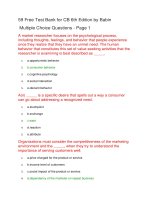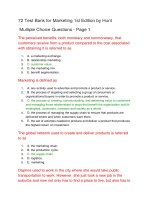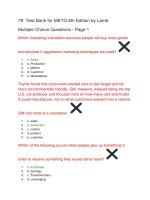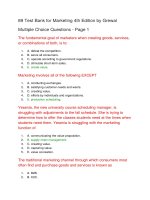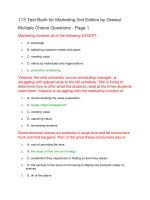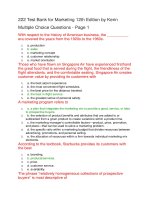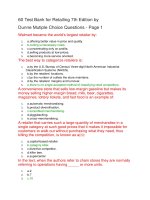Test bank for COMM 4th edition by verderber
Bạn đang xem bản rút gọn của tài liệu. Xem và tải ngay bản đầy đủ của tài liệu tại đây (162.51 KB, 9 trang )
Test Bank for COMM 4th Edition by Verderber
Full
file at />Name:
Class:
Date:
Chapter 01: Communication Perspectives
1. The process of putting our thoughts and feelings into words and nonverbal behaviors is called _____.
a. encoding
b. decoding
c. sending
d. scrambling
ANSWER: a
2. Kate tells her son Ben to tidy his room. Ben, who does not like the task, agrees to it but mumbles under his breath and
makes a face. Ben’s response is an example of _____.
a. a script
b. feedback
c. a code
d. noise
ANSWER: b
3. A _____ is a “mental library” of scripts each of us draws from to create messages based on what worked for us or
others in the past.
a. script
b. canned plan
c. channel
d. communication index
ANSWER: b
4. Which of the following is true of scripts?
a. They are only developed in childhood.
b. They help in better communication when present in large numbers.
c. They can be developed only through personal experiences rather than observations.
d. They can be used only in interpersonal communication.
ANSWER: b
5. Ronnie had a violin recital at his school. He played beautifully, but the acoustics in the room were so bad that only the
people in the first few rows could hear him. This is an example of failed communication because Ronnie did not take
into account the _____.
a. social context
b. psychological context
c. physical context
d. historical context
ANSWER: c
Copyright Cengage Learning. Powered by Cognero.
Full file at />
Page 1
Test Bank for COMM 4th Edition by Verderber
Full
file at />Name:
Class:
Date:
Chapter 01: Communication Perspectives
6. The _____ is the nature of the relationship that already exists between participants.
a. cultural context
b. physical context
c. psychological context
d. social context
ANSWER: d
7. Marsha and Rachel went shopping for clothes. Marsha bought a new pair of jeans. The following day, Marsha,
Rachel, and Markus met for coffee. Upon seeing Marsha in her new jeans, Rachel exclaimed, “Oh! You wore the
new ones.” Marsha nodded and smiled, but Markus had no idea what they were talking about. In this scenario,
Markus did not understand the meaning of “the new ones”, because he did not know the _____ of their
communication.
a. physical context
b. social context
c. historical context
d. psychological context
ANSWER: c
8. Which of the following statements is true of intrapersonal communication?
a. It plays a role in shaping our self-perceptions.
b. It is usually verbalized as monologues.
c. It rarely occurs subconsciously.
d. It occurs when you engage in a conversation with a friend.
ANSWER: a
9. _____ is the fear associated with communicating with others.
a. Psychological noise
b. Communication context
c. Communication apprehension
d. Interaction coordination
ANSWER: c
10. _____ is characterized by informal interaction between two people who have an identifiable relationship with each
other.
a. Intrapersonal communication
b. Mass communication
c. Interpersonal communication
d. Public communication
ANSWER: c
Copyright Cengage Learning. Powered by Cognero.
Full file at />
Page 2
Test Bank for COMM 4th Edition by Verderber
Full
file at />Name:
Class:
Date:
Chapter 01: Communication Perspectives
11. Which of the following is a difference between interpersonal and intrapersonal communication?
a. Interpersonal communication occurs nonverbally, whereas intrapersonal communication does not occur
nonverbally.
b. Interpersonal communication is delivered through mass media, whereas intrapersonal communication occurs
within a group.
c. Interpersonal communication occurs between two people, whereas intrapersonal communication takes place
only in our minds.
d. Interpersonal communication occurs between two people with a high level of intimacy, whereas intrapersonal
communication can occur between any two people regardless of intimacy.
ANSWER: c
12. _____ typically involves three to 20 people who come together to communicate with one another.
a. Interpersonal communication
b. Intrapersonal communication
c. Mass communication
d. Small-group communication
ANSWER: d
13. Sara’s family meet every weekend for dinner. When they meet, they talk about each other and what happened during
the week. In this case, Sara’s family is involved in _____.
a. intrapersonal communication
b. mass communication
c. interpersonal communication
d. small-group communication
ANSWER: d
14. Unlike public communication, mass communication:
a. occurs in our minds.
b. involves communicating with three to 20 people in order to solve a problem.
c. is delivered to large segments of the population at the same time.
d. occur only in face-to-face settings.
ANSWER: c
15. Which of the following is a similarity among mass, public, and group communication?
a. They all are forms of intrapersonal communication.
b. They all occur only in face-to-face settings.
c. They all involve communicating with more than two people.
d. They all are devoid of nonverbal contextual clues.
ANSWER: c
Copyright Cengage Learning. Powered by Cognero.
Full file at />
Page 3
Test Bank for COMM 4th Edition by Verderber
Full
file at />Name:
Class:
Date:
Chapter 01: Communication Perspectives
16. _____ are textual images that symbolize the sender’s mood or facial expressions.
a. Acronyms
b. Emoticons
c. Doodles
d. Designs
ANSWER: b
17. A technologically mediated communication channel:
a. lacks nonverbal and visual images.
b. uses movements and gestures.
c. uses acronyms that stand for common phrases.
d. has the highest media richness and synchronicity.
ANSWER: c
18. Which of the following is true of media richness?
a. Written communication has the richest media channel.
b. The less information offered via a given channel, the leaner it is.
c. The richness of the channel depends on the number of people involved in a conversation.
d. The leaner the channel, the greater the chances are for understanding.
ANSWER: b
19. _____ is any stimulus that interferes with the process of achieving shared meaning.
a. Noise
b. Feedback
c. Control
d. Synchronicity
ANSWER: a
20. During class, Adam could not concentrate on the lecture because he was thinking of a movie that he watched the
previous night. In this scenario, Adam is distracted from the lecture due to _____.
a. physiological noise
b. semantic noise
c. psychological noise
d. physical noise
ANSWER: c
Copyright Cengage Learning. Powered by Cognero.
Full file at />
Page 4
Test Bank for COMM 4th Edition by Verderber
Full
file at />Name:
Class:
Date:
Chapter 01: Communication Perspectives
21. Which of the following is a characteristic of communication?
a. Communication can happen without a purpose.
b. Communication ends when a person interprets your message.
c. Once an exchange takes place, it is not reversible.
d. Messages can be interpreted in the same way across all settings.
ANSWER: c
22. Communication being indexical means that:
a. it is measured by taking information at face value.
b. symmetrical feedback signals disagreement about who is in control.
c. it is based on the level of trust, control, and intimacy in a relationship.
d. complementary feedback signals agreement about who is in control.
ANSWER: c
23. In a movie screening, the audience shrieked out of fear during a scene. This is an example of _____.
a. a constructed message
b. synchronicity
c. a spontaneous expression
d. immediacy
ANSWER: c
24. While playing, Marcie exclaimed, “Ouch!” as she slipped in the mud and fell down. Marvin immediately asked, “Are
you alright?” When she said, “No!” Marvin carefully said, “All right,” “This is a new situation. Why don’t we go find
a hose and try to clean you off?” In this scenario, Marvin’s message is an example of _____.
a. a spontaneous expression
b. synchronicity
c. a constructed message
d. physical noise
ANSWER: c
25. Which of the following is true of intercultural communication?
a. Messages are formed and interpreted in different ways.
b. It is not continuous in nature.
c. All cultures respond to messages in a similar way.
d. There is a lack of intimacy and trust between individuals.
ANSWER: a
Copyright Cengage Learning. Powered by Cognero.
Full file at />
Page 5
Test Bank for COMM 4th Edition by Verderber
Full
file at />Name:
Class:
Date:
Chapter 01: Communication Perspectives
26. Which of the following statements is true of ethical communication?
a. We make choices with ethical implications only when we communicate complex messages.
b. Dark side messages are ethical but inappropriate.
c. Ethical communicators are truthful and honest.
d. People benefit from dark side responses depending on the situation.
ANSWER: c
27. Ethical communicators:
a. maintain inconsistency between their actions and words.
b. consider all the circumstances even if they are irrelevant to situation at hand.
c. refrain from gossiping, bullying, and spreading rumors.
d. communicate easy dark side messages.
ANSWER: c
28. Communication is effective when it:
a. conforms to expectations.
b. achieves its goals.
c. increases apprehension.
d. emphasizes only the verbal cues.
ANSWER: b
29. People who experience situational communication apprehension:
a. feel anxious in most speaking situations.
b. experience anxiety only when receiving immediate feedback on their communication.
c. experience a short-lived anxiety that occurs during specific encounters.
d. feel anxious about speaking only with a certain person or group of people.
ANSWER: c
30. Trying to decide for oneself on what food to eat is an example of intrapersonal communication.
a. True
b. False
ANSWER: True
31. Interpersonal communication usually occurs through mass media.
a. True
b. False
ANSWER: False
Copyright Cengage Learning. Powered by Cognero.
Full file at />
Page 6
Test Bank for COMM 4th Edition by Verderber
Full
file at />Name:
Class:
Date:
Chapter 01: Communication Perspectives
32. Synchronicity is the extent to which a channel allows for immediate feedback.
a. True
b. False
ANSWER: True
33. The main role of feedback is to avoid semantic noise.
a. True
b. False
ANSWER: False
34. Symmetrical feedback signals agreement about who is in control.
a. True
b. False
ANSWER: False
35. What is considered competent communication in one culture may not be true of another culture.
a. True
b. False
ANSWER: True
36. People who experience traitlike communication apprehension feel anxious about speaking only with a certain person
or group of people.
a. True
b. False
ANSWER: False
37. Explain the characteristics of group communication and mass communication with examples.
ANSWER: Small-group communication typically involves three to 20 people who come together to communicate with
one another. Examples of small groups include a family, a group of friends, a group of classmates working
on a project, and a workplace management team. This type of communication can occur in face-to-face
settings as well as online through electronic mainlining lists, discussion boards, virtual meetings, and blogs.
Mass communication is delivered by individuals and entities through mass media to large segments of the
population at the same time. Some examples include newspaper and magazine articles and
advertisements, as well as radio and television programs and advertisements.
Copyright Cengage Learning. Powered by Cognero.
Full file at />
Page 7
Test Bank for COMM 4th Edition by Verderber
Full
file at />Name:
Class:
Date:
Chapter 01: Communication Perspectives
38. Define three aspects of communication contexts and discuss how each affects interpersonal communication.
ANSWER: Three aspects of communication contexts are the physical context, social context, and psychological
context.
The physical context includes the location of the communication encounter, the environmental conditions
surrounding it (temperature, lighting, noise level), and the physical proximity of participants to each other.
Our ability to share meaning can be affected by the physical context. For instance, when you telephone a
friend instead of talking to him or her face-to-face, you lose nonverbal cues such as posture, gestures, eye
contact, and facial expressions.
The social context of communication is the nature of the relationship that already exists between
participants. The better you know someone and the better relationship you have with him or her, the more
likely you are to accurately interpret the messages.
The psychological context refers to the moods and feelings each person brings to the communication
encounter. For instance, if a person is under a great deal of stress, he or she may display that stress in the
form of irritation. Even if it has nothing to do with a specific communication encounter, the other person
could misinterpret it as something he or she did.
39. Daniel is at a store to purchase clothes. In one of the fitting rooms, he finds a wallet with an ID and $500. He realizes
that he can either take the money and leave the wallet behind or hand over the wallet along with the cash at the
service desk in the store. Define two ethical principles that influence communication and apply them to this moral
dilemma.
ANSWER: Ethical communicators are honest. It means they do not intentionally try to deceive others. In this
scenario, Daniel should hand over the cash and the wallet at the service desk and say that he found it.
Ethical communicators act with integrity. It means maintaining consistency between what they say they
believe and what they do. It is the opposite of hypocrisy. In this situation, it means Daniel should hand
over the wallet along with the cash at the service desk and explain how it was found.
40. Explain how social ease is important to being a competent communicator.
ANSWER: Communication competence is the impression that communicative behavior is both appropriate and
effective in a given situation. Social ease means managing communication apprehension so we do not
appear nervous or anxious. It influences whether others perceive us to be competent communicators. To
be perceived as a competent communicator, we must speak in ways that convey confidence and poise.
Communicators that appear apprehensive are not likely to be regarded as competent, despite their
motivation or knowledge.
41. _________ is delivered by individuals and entities through mass media to large segments of the population at the
same time.
a. Intrapersonal communication
b. Mass communication
c. Interpersonal communication
d. Public communication
ANSWER: Mass communication
Copyright Cengage Learning. Powered by Cognero.
Full file at />
Page 8
Test Bank for COMM 4th Edition by Verderber
Full
file at />Name:
Class:
Date:
Chapter 01: Communication Perspectives
42. Communication is _________.
A. intermittent
B. purposeful
C. sporadic
D. unnecessary
ANSWER: purposeful
43. How we communicate is a(n) _________ or measure of the emotional temperature of our relationship at the time.
A. scale
B. index
C. code
D. script
ANSWER: index
44. According to Samovar, Porter, and McDaniel, _________ is a cultural component relevant to the study of
intercultural communication.
A. pattern of cognition
B. gender norm
C. academic average
D. public intimacy
ANSWER: Patterns of cognition
45. _________ concerns permeate all of communication.
A. Cultural
B. Mental
C. Academic
D. Monetary
ANSWER: Cultural
46. According to interpersonal communication scholars, Spitzberg and Cupach, _________ refers to messages that are
ethical and appropriate.
A. bright side messages
B. dark side messages
C. easy dark side messages
D. grey side messages
ANSWER: bright side messages
47. To be perceived as a competent communicator, we must portray _________.
A. apprehension
B. edginess
C. social ease
D. flexibility
ANSWER: social ease
Copyright Cengage Learning. Powered by Cognero.
Full file at />
Page 9
